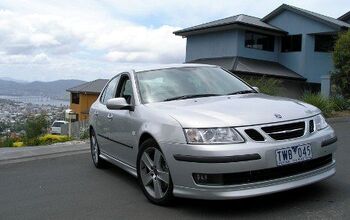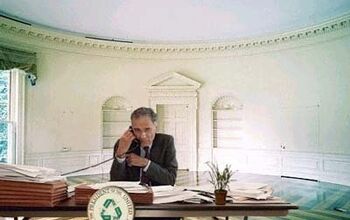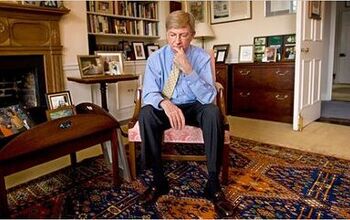Bailout Watch 32: Farago Votes Nay
Detroit refuses to contemplate the only possible savior for their broken businesses: bankruptcy. Unless Chrysler, Ford and GM use Chapter 11 protections to kill products, spike brands, close factories, “renegotiate” labor agreements, terminate dealers and generally reinvent themselves, they will continue to die by a thousands cuts. The automakers’ pride– and their belief that “no one buys cars from a bankrupt automaker”– prevents this radical move. So, instead, they’re pursuing a federal bailout. Only they don’t call it that. And therein lays the seeds of their final destruction.
Motown’s federal bailout is set to arrive as $50b worth of low-interest federal loans. The money is a [now-inflated] part of a $25b provision in last year’s Energy Bill, disguised as an attempt to “help” Detroit retool 20-year-old factories for a fuel-efficient future. TTAC and other commentators immediately identified it as a bailout. Simply put, the 20-year caveat restricts the loans to Detroit.
Thanks to the very public Bear Stearns bailout debacle, and the even more prominent Fannie Mae and Freddie Mac “rescue,” and The Big 2.8’s increasingly obvious financial distress, the convenient falsehood of Detroit’s “green” federal assistance has lost currency. Hence Bill Ford, Alan Mulally, Mark Fields, Rick Wagoner, Bob Lutz, Jim Press and the rest of the Motown elite are busy denying that the money is a bailout. As Queen Gertrude remarked about her evil doppelganger in Hamlet’s play-within-a-play, “The lady doth protest too much, methinks.”
There are a couple of simple reasons why Detroit won’t come clean about their need for a taxpayer-sponsored financial infusion. First and foremost, personal power.
As Edward Niedermeyer observed in his Aporkalypse Now editorial, we’ve been here before. The last automaker “bailout” was bestowed up Chrysler. It was, in fact, a federal loan guarantee program (this time it’s actual loans). Uncle Sam demanded an executive shakeup and enough management-related strings to turn the Pentastar Pinocchio back into a marionette. If any of the current players admitted to the feds that the $50b was a bailout, they’d lose their autonomy (i.e. power) and, most probably, their jobs.
If you wanted to be more charitable about Detroit’s craven denial of their position at the head of shit creek sans paddle, you could say that Ford, GM and Chrysler don’t want to destroy their [remaining] customer loyalty. (Never mind potential conquest sales, we’re moving beyond that now.) They recognize that the word “bailout” and “bankruptcy” are virtually interchangeable in the public mind. And for good reason. It’s the truth.
While Motown’s moguls deem this prevarication necessary to shield the buying public from the heretofore under-the-radar realization that one, two or all three Detroit automakers are in real danger of going bye-bye (say sayonara to your vehicle’s resale value), the lie puts The Powers that Be in a ludicrous position. Even as they hustle over to Capitol Hill to secure their piece of the multi-billion dollar public pie they must pretend that everything’s hunky dory.
“Ford CEO says effort to regain profits going well” today’s Detroit News headline blares. Yes, OK, if everything’s going so well, why does Ford and friends need $50b of our money to fund their recovery? Bill Ford trotted-out the new party line: it’s all about the SPEED of bringing green machines into the supposedly free market. If the money is denied, “It would just make everything more difficult, and we may have to go slower, and that’s clearly not what society wants.”
Sure, I blame society. But it’s hardly likely that society will blame society. Despite the fact that bailout bucks are free-flowing at the moment, despite the fact that Michigan is a key state in the upcoming presidential election, despite Detroit’s cunning plan to avoid speaking the word “Voldemort” in public, The Big 2.8 are not going to have as an easy time of this as they think.
The “bailout by any other name would still be so green” ruse may fool willfully ignorant Big 2.8 dependents– execs, union workers, suppliers, dealers, etc.– but the “change Washington” election rhetoric circulating through the rest of the country indicates a growing Pink Floyd mentality: “keep your hands off of my stash.” During these times of pseudo-austerity, telling the people’s representative that $50b in federal funds is “nice, but not REALLY needed” is not going to be a particularly convincing strategy.
This whole boondoggle is just another in a long line of half-assed, boneheaded decisions that reflects Detroit’s ongoing inability to fully face their actual, honest-to-God brand, product and profitability problems and develop a viable strategy– now involving Chapter 11– to overcome them.
There is but one word that truly suits this $50b federal loan guarantee/bailout program: enable. Even with some pertinent strings, the money will simply enable Detroit to continue its addiction to stupidity, sloth, greed and arrogance. And that’s why I believe Detroit should not receive the funds.
More by Robert Farago
Latest Car Reviews
Read moreLatest Product Reviews
Read moreRecent Comments
- Flashindapan I always thought these look nice. I was working at a Land Rover dealership at the time the LR3 came out and we were all impressed how much better it was then the Discovery in just about every measurable way.
- Bd2 If I were going to spend $ on a ticking time bomb, it wouldn't be for an LR4 (the least interesting of Land Rovers).
- Spectator Wild to me the US sent like $100B overseas for other peoples wars while we clammer over .1% of that money being used to promote EVs in our country.
- Spectator got a pic of that 27 inch screen? That sounds massive!
- MaintenanceCosts "And with ANY car, always budget for maintenance."The question is whether you have to budget a thousand bucks (or euro) a year, or a quarter of your income.


































Comments
Join the conversation
G2H, Sorry, You missed your chance by throwing out a lot of politically loaded stuff. I am not buying. As far as I am concerned, it doesn't matter if they half the fine, stop enforcing, or anything else. If the law is on the books, it is still there. If I still have to send in a form, nothing changed. If compliance is voluntary, all you changed was the chance that you might get caught. For those who don't want to go foul of the law, there is still WAY too much regulation in this country. For those who cheat, there is never enough.
I can't quite buy a reversal of a snowmobile ban in national parks or reconsideration of a manatee protection plan as examples of deregulation.